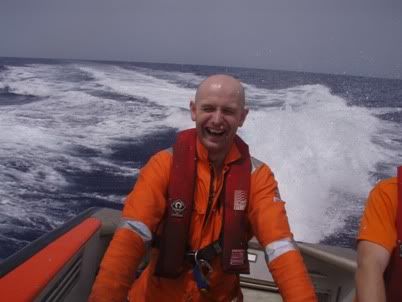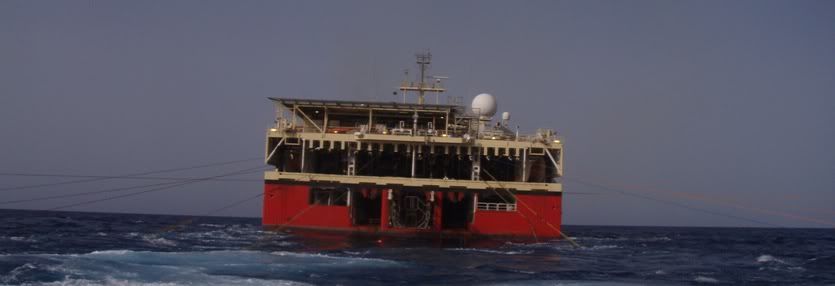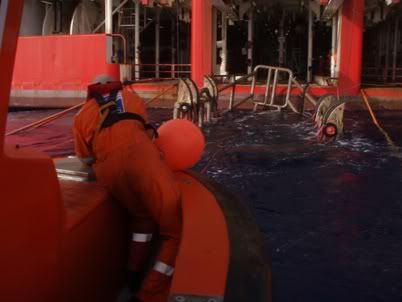
I've been accepted as a trainee at Petroleum Geo Services (PGS), without really knowing fully what I was getting into.
The last time I knew what I was going into, I worked as an electrician without really enjoying it... ...no, wait, the last time I started in a new job I knew totally what it was about, I was a cable-guy, spending a lot of work-time with private customers in their homes. I'm not
that much of a peoples person, so I didn't really enjoy that, even if I had really great co-workers like widing'cuda, who's one of my best friends, his brother, and a mutual friend.
While on the other hand, when I did something else without really knowing the extent of it, I found myself working with battery management systems, and had a great time at that place. Awesome co-workers like another one of my best friends, and the job was with professional clients that I rarely, if ever, saw, and when I did, they were acting like good people. I much prefer clients to customers. And during the cable-guy time, I signed a three year preparedness-contract with the army, thinking it would most likely not go anywhere, meaning that I didn't really think it through, I just did it in the hope of getting some better thing to do than being a cable-guy. Well, that signature I put on that dotted line would ultimately mean that I got to spend 2 x 1 year in Afghanistan, and not regretting a second of those years!
Having in mind that I’m apparently not fit to manage my own life, because the best things usually happens when I don't really know what I’m about to do with my life, I was not the least bit frightened to apply for a job on a seismic ship as a seismic mechanic, since one of qualifications asked for among the slash this, slash that, slash some-or-another thing, was electrician, and with people with military experience being encouraged to apply, I thought I could at least try. I figured that the worst thing that could happen was a letter where they tell me to go and perform an anatomically impossible XXX-act on myself, only wording it nicer, or just no reply at all. But none of that happened, or actually, nothing did happen at first, so I called PGS and asked about my application, being very pro-active and such, and would you believe that the person I talked with couldn't find my application anywhere, even with the aid of the mail I received after sending my application?
So she asked me about my qualifications, and based on them, I was encouraged to apply for some other positions with a later application deadline.
One of those was as a observer trainee, and when I checked the qualifications required for
that, I thought no way, because the closest I come to having a degree in computers is being not so bad at certain computer games, and while I did take some pride in putting my best efforts into improving my skills in the "Hitman"-series, I seriously doubt that they will come in handy on a seismic vessel. So I decided to wait a little with that application, and talk with a friend, the earlier mentioned mutual friend at the cable-TV installation company, who since then had moved on to be a seismic technician with another seismic company. Before any of that happened, I got a phone call from a nice woman at PGS, who had seen my application, and wondered if I would like to come on a interview?
Does the Pope wear a funny hat?
We agreed on a date for the interview, and I was happy.
Then it was time for the interview, I was quite prepared to having it conducted in English, since that's the work-language, and a good test of my English would be just that. No, instead it was partly in Swedish, and partly in Northern-Norwegian (Where I'm from) since that's where other of the interviewers were from too. The Swedish woman remarked upon my hobby, my Challenger, and said she used to be a raggare in her youth. Raggare is a Swedish phenomenon, with a strong preference of old american iron, among other parts of their image.
Things looked real good already, but after some time in the interview, the northern-Norwegian guy asked me if it was really important for me to be a seismic mechanic
To which I replied that it really wasn't. And he said, "that's good, because your qualifications for that is $hit, but you have good qualifications to become an observer! Would you be interested in giving it a try?"
Well, I certainly was so, and then the interview proceeded to be about life on the seismic vessels. I left the interview with an idea that I would be doing mostly maintenance of the seismic equipment, something that would involve multimeters, soldering, messing with wires, and such.
And that I would spend some time in the instrument room, getting to understand what the
other people did aboard.
However, to begin working offshore, I needed a offshore safety course, with training on how to use an immersion suit, how to use a self-breather aid, how to get into a lifeboat and secure myself quickly, how escape from a helicopter landing on water, a helicopter landing on water and turning over, how to turn an upside-down life raft. Basically, really goooooood things to know how to do if I ever should need the skills.
I wish I could post some pics from the training, but the woman who were taking pics and promising to share them haven't replied to my emails, so I'll just instead post the link to a YouTube-video.
This video focuses on a British singer, but it does show a facility similar to the one I learned at:
I didn't get the actual lifeboat launch, only a dry simulation where we pretended to launch.
So, I got my HUET (Helicopter Underwater Escape Training) certificate, and I was sent out to a vessel outside Egypt.
When I arrived in Cairo, I and a couple of other guys were met at the airport, and aided through customs, and got our visas done at the spot, and were sent to the quite nice hotel PGS had reserved rooms at.
Once there, a navigator and I decided that we had enough time left of the day to be tourists, so we went to see the pyramids.
This is a story on its own, and I will post it separately later, hopefully by tomorrow. Haven't got much time to write long posts these days.
The next morning, we had to get up early and fly to Alexandria where we would wait, wait, wait some more, and fly by helicopter to the vessel we were to spend the next five weeks at. When I arrived at the vessel, M/S Ramform Valiant, I was assigned to the nightshift, and was told to get some sleep before the shift started at midnight. Not easy to sleep while being a little exited about all the new things around me. Not to mention that I got food poisoned in Alexandria, something that began to make itself noticed pretty early after arrival. Lasted ten days it did. I was not very energic those days.
When the shift began, I quickly realised that I was going to spend a lot of time in the instrument room, because that's where the observers do a lot of their work, watching and operating 15 screens!!! I was going to begin in a new job that eventually will require me to be on top of things happening on 15 screens, and the helicopters had left a long time ago, so there was no chance to leave, not even to cling on to the landing gear like a south-vietnamese during the US withdrawal from Vietnam. So I came to terms with my situation, and found that not all the screens are equally important. Only a handful of them have the potential to cost the company some hundreds of thousand dollars if we don't pay attention. Other screens are just pretty seriously important, and some very important, others a bit important, and one that's only important for weather reports. And the camera screen is not vital, and neither is the screen for the other observer to work on. Still, I'm pretty glad that I'm bald already, or my hair would've gone white.
At this moment, things are much better, my mentor, the other co-workers, and even the bosses are great people, I'm much more comfortable with the screens, and I've began learning practical stuff doing maintenance.
There's also been a few tours in the workboat, and that thing really moves! It's a little workboat that got two 340 HP engines!
A link for any CCC'ers that's into boats:
http://www.maritimejournal.com/archive/2006/june/ship__and__boat_building/light_touch_for_seismic_survey_boat?SQ_DESIGN_NAME=pfHere I'm holding on, and enjoying the ride:

I even believe that I can learn to do this! It's actually not that insanely difficult, it's just a lot of new stuff at once. A little dwindle of the stuff I've been thaught is only to be expected, and they even told me so.
The boat as seen from behind:

The ropes are for the streamers, we are towing 10 streamers that's each 8.1 kilometer long, or 5.03 miles.
Here I'm trying to release the workboat, but attempting to release the rope at the wrong place:

Today, we’ve on our third week, only 17 days to go before crew change!
Soon going to be home with my girlfriend and the Challenger!